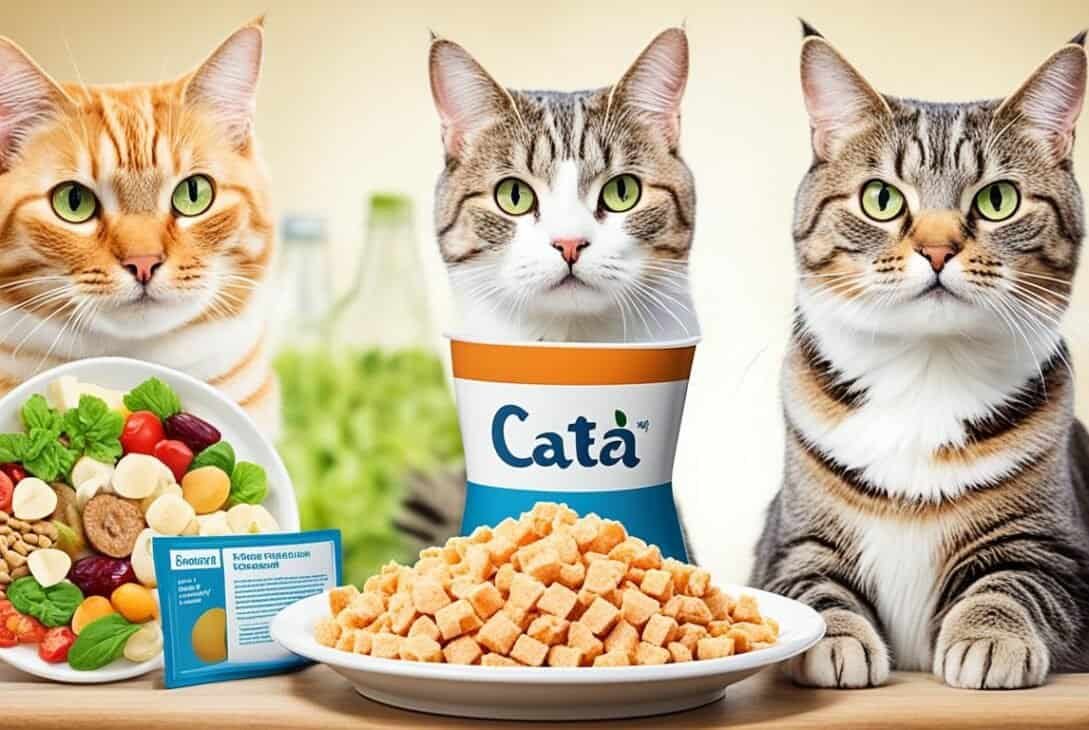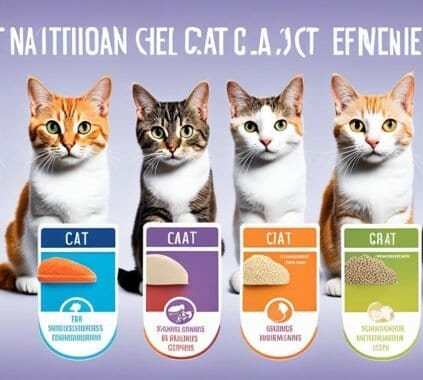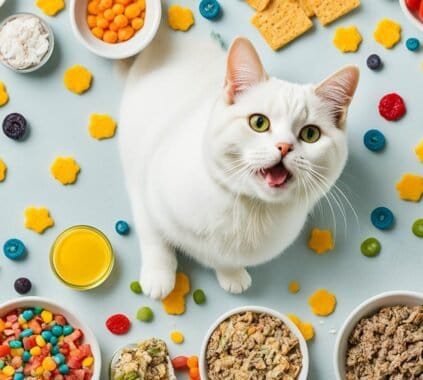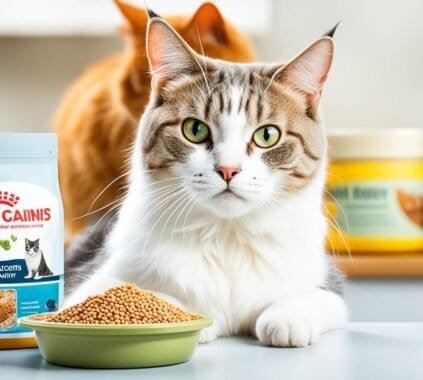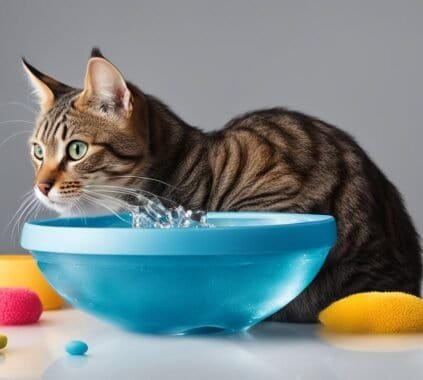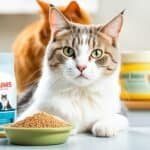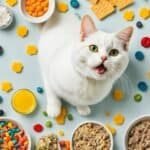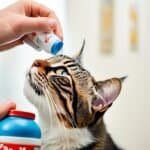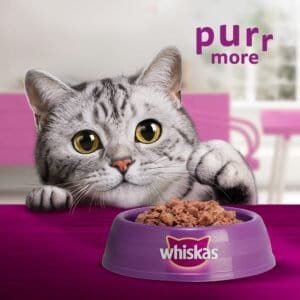Cats are unique creatures with specific dietary needs. As obligate carnivores, they require certain nutrients found only in animal products. To maintain their health and well-being, it is essential to provide them with a diet that is high in protein, moderate in fat, and low in carbohydrates.
Commercial cat food comes in various types, including dry, semi-moist, and canned options. Each type has different water content, protein levels, and digestibility. When choosing cat food, it is important to read the nutrition label and ingredients list carefully to ensure it meets your cat’s nutritional needs.
Homemade diets are not recommended unless under the guidance of a veterinarian. It can be challenging to create a well-balanced diet that provides all the necessary nutrients for your cat’s health. Treats should only be given occasionally and in moderation to prevent weight gain and nutritional imbalances. Cat special diets for health issues should be always considered
Keeping your cat at a healthy weight is crucial to prevent obesity-related health issues. Obesity can lead to various problems, including diabetes, joint pain, and reduced lifespan. Regular exercise and portion control are essential to help your cat maintain a healthy weight.
- Cats are obligate carnivores and require a diet high in protein.
- Commercial cat food comes in different types, each with its own benefits and considerations.
- Reading the nutrition label and ingredients list is crucial when choosing cat food.
- Homemade diets should only be used under veterinary guidance.
- Treats should only be given occasionally and in moderation.
Necessary Nutrients for Cats
Cats require a variety of essential nutrients to maintain optimal health and well-being. These nutrients include vitamins, minerals, fatty acids, and amino acids. Each nutrient plays a crucial role in supporting different bodily functions.
Vitamins and Minerals
Vitamins and minerals are necessary for various metabolic processes in cats. They support immune function, promote healthy skin and coat, aid in digestion, and contribute to proper bone development. However, it’s important to note that more is not always better when it comes to vitamins and minerals. Excessive amounts can be harmful to cats, leading to toxicity or imbalances. It’s recommended to provide these nutrients through a balanced diet rather than relying on supplements without veterinary approval.
Fatty Acids
Fatty acids, such as omega-3 and omega-6, are crucial for cats’ overall health. These essential fatty acids support brain function, maintain a healthy coat, reduce inflammation, and support cardiovascular health. Cats cannot synthesize these fatty acids on their own, so they must obtain them from their diet. Including sources of fatty acids, such as fish oil or flaxseed oil, in a cat’s diet can help ensure they receive adequate amounts.
Amino Acids
Amino acids are the building blocks of proteins, which are essential for cats’ growth, repair, and maintenance of body tissues. Cats have specific dietary requirements for certain amino acids, such as taurine and arginine, which are found primarily in animal-based protein sources. Taurine deficiency, for example, can lead to serious health issues, including heart disease and vision problems. Providing high-quality protein sources in a cat’s diet is crucial to meet their amino acid needs.
Hydration
Water is vital for cats’ overall health and well-being. Cats have a low thirst drive, so it’s important to ensure they have access to clean, fresh water at all times. Hydration is especially important for cats with health issues, as some conditions may affect their water balance. Incorporating wet cat food or adding water to dry food can help increase their water intake and promote optimal hydration.
To ensure your cat receives the necessary nutrients, focus on feeding them a balanced and high-quality diet that meets their specific nutritional needs. Consulting with a veterinarian can help you develop a proper feline diet plan tailored to your cat’s health problems. By providing a nutritionally balanced diet and adequate hydration, you can help support your cat’s overall health and address specific health concerns.
Types of Commercial Cat Food
When it comes to choosing the best food for cats with health issues, tailored cat diets for health concerns are essential. Commercial cat food offers a variety of options to cater to your cat’s specific needs. Here are the three main types of commercial cat food:
Dry Food
Dry food is a popular choice for many cat owners. It is relatively inexpensive and offers the convenience of free-choice feeding, allowing your cat to eat whenever they want. However, it’s important to note that dry food may be less palatable and digestible compared to moist options. If your cat has dental issues or prefers crunchier food, dry food can be a suitable choice.
Semi-Moist Food
For cats who have a preference for soft and moist food, semi-moist options can be a great choice. Semi-moist food is more appealing to some cats but can dry out and become less palatable over time. If your cat enjoys the texture and flavor of moist food, this type might be an excellent option to consider.
Canned Food
Canned food has a high moisture content and is highly palatable, making it an excellent choice for cats with health issues. It provides a good source of hydration for cats and offers a wide range of flavors and textures to suit even the finickiest eaters. Canned food is recommended for cats who need to increase their water intake or have difficulty eating dry or semi-moist food.
When selecting the best food for your cat with health concerns, consider their preferences and specific dietary requirements. Experiment with different options to find the right balance between palatability, nutrition, and health benefits.
Remember, each cat is unique, and their nutritional needs may vary. Consulting with your veterinarian can help guide you in making the best decision for your cat’s health and well-being.
Choosing the Right Food for Your Cat
When it comes to the health and well-being of your cat, choosing the right food is of utmost importance. Commercially prepared cat foods have been specifically formulated to meet the unique nutritional requirements of cats, ensuring they receive the necessary nutrients for optimal health.
To make an informed decision, it’s crucial to carefully read the nutrition label and ingredients list on cat food packaging. Look for foods that list high-quality animal protein sources, such as chicken, turkey, or fish, among the first few ingredients. This is essential as cats are obligate carnivores and require a diet rich in animal-based protein.
The Association of American Feed Control Officials (AAFCO) establishes regulations for pet food labeling, providing guidelines to help pet owners make informed choices. When selecting cat food, consider your cat’s life stage. Cat foods are formulated differently for kittens, adult cats, pregnant or lactating cats, and cats with specific health conditions or concerns. Choose a cat food that is complete and balanced for your cat’s particular life stage and nutritional needs.
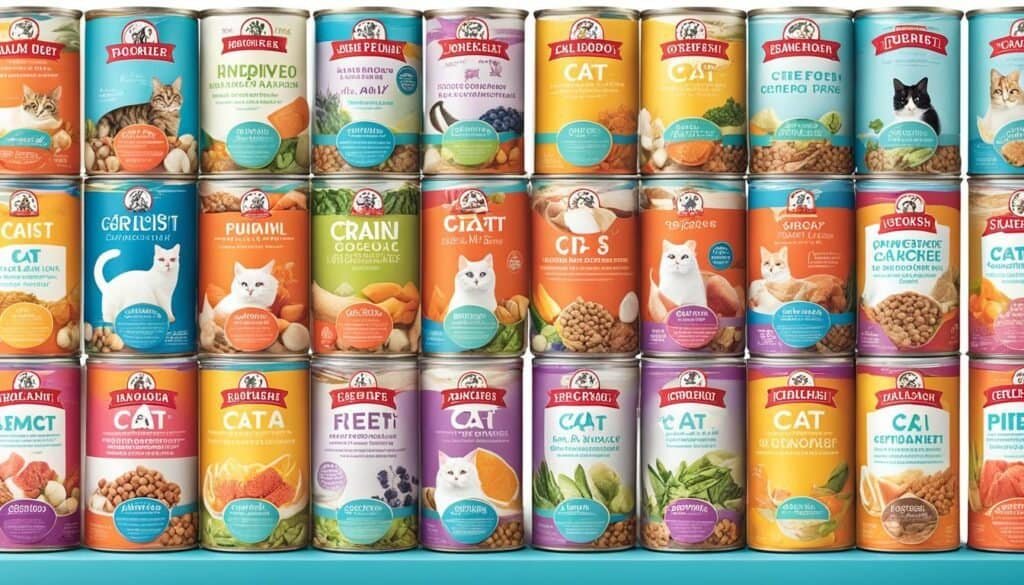
Homemade Diets and Treats
While commercially balanced and complete cat foods are generally recommended, there may be cases where a homemade diet is necessary for cats with special health conditions. However, it’s important to note that making homemade cat food can be challenging and time-consuming.
When considering a homemade diet for your cat, it’s crucial to consult with a veterinarian who can provide guidance and recommend a recipe tailored to your cat’s specific needs. They will help ensure the diet meets all the necessary nutrient requirements and addresses any health concerns.
When it comes to treats, it’s important to remember that they should only be given occasionally and in small amounts. Treats are not nutritionally complete and balanced like regular cat food.
Here are some important considerations when it comes to homemade diets and treats for cats:
- Avoid toxic foods: Certain foods such as onions, garlic, chocolate, and grapes are toxic to cats and should be avoided at all costs. These foods can lead to severe health issues and even be fatal for cats.
- Milk and dairy products: While cats are known for their affinity for milk, many cats are lactose intolerant, leading to gastrointestinal problems if fed dairy products. It’s best to avoid giving milk to cats altogether.
By following these guidelines, cat owners can provide their furry companions with the most suitable and safe diets, especially for cats with health conditions. Always consult with a veterinarian for personalized guidance.
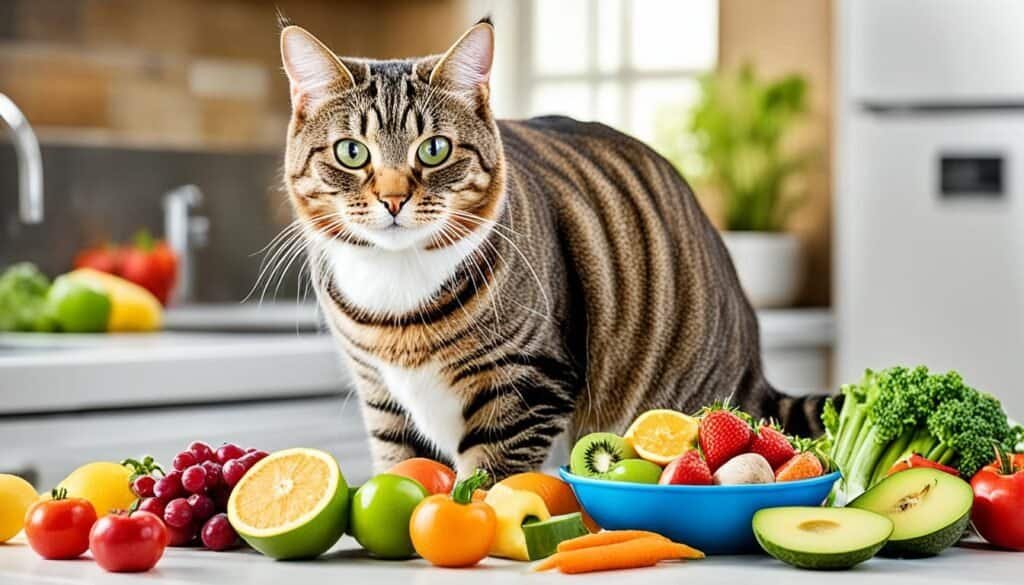
Conclusion
Feeding cats a proper and balanced diet is crucial for their overall health and well-being. As obligate carnivores, cats have specific dietary needs that can only be met through animal products. High levels of protein are essential in their diet to support proper growth, maintenance, and repair of tissues.
Commercial cat foods are specially formulated to meet these nutritional requirements and provide a convenient and reliable option for cat owners. By choosing the right type of cat food that suits your cat’s preferences and health needs, you can ensure they are receiving the necessary nutrients for optimal health.
While homemade diets may seem like a viable alternative, it is important to consult with a veterinarian before doing so. Homemade diets require careful formulation and may not provide all the essential nutrients required for a cat’s well-being. Veterinary guidance can help ensure that any homemade diets are nutritionally balanced and meet the unique dietary needs of your cat.
In addition to the main meals, treats should be given sparingly. While treats may be enjoyed by cats, they should not form a significant portion of their diet. Proper portion control and moderation are key to preventing weight gain and promoting overall health.
Lastly, fresh and clean water should always be available for cats. Adequate hydration is crucial for their health, and maintaining a clean water source helps prevent potential illnesses and dehydration.
By understanding and meeting the dietary needs of cats, cat owners can help safeguard their feline companions from health issues related to nutrition and support their overall well-being.
FAQ
What type of diet do cats with health issues need?
Are homemade diets recommended for cats with health issues?
How should treats be given to cats with health issues?
What types of commercially prepared cat food are available?
How can I choose the right food for my cat’s specific health issue?
Can I make homemade cat special diets for health issues prevention?
Last modified: March 4, 2024

